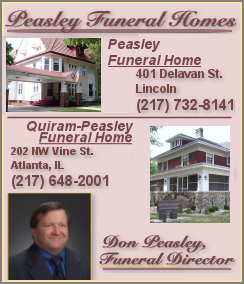Labor-backed bill banning 'captive audience' meetings awaits House
action
 Send a link to a friend
Send a link to a friend
[May 11, 2024]
By ALEX ABBEDUTO
Capitol News Illinois
abbeduto@capitolnewsillinois.com
 SPRINGFIELD – With two weeks left before the General Assembly's spring
session is set to adjourn, negotiations continue on a labor union-backed
initiative that would allow Illinoisans to skip religious and political
work meetings without reprimand. SPRINGFIELD – With two weeks left before the General Assembly's spring
session is set to adjourn, negotiations continue on a labor union-backed
initiative that would allow Illinoisans to skip religious and political
work meetings without reprimand.
Dubbed the “Worker Freedom of Speech Act,” Senate Bill 3649 advanced out
of the Senate on May 2 with only Democratic support.
The Illinois AFL-CIO labor organization brought the measure to Sen.
Robert Peters, D-Chicago, in an effort to ban what the unions refer to
as employer-sponsored “captive audience meetings” pertaining to religion
and politics. Labor advocates say the meetings give employers an
opportunity to coerce employees to listen to anti-union rhetoric.
Employers found breaking the law would have to pay $1,000 per violation
and provide relief to the wronged employee as the court dictates, which
could involve paying owed wages and reinstating their position.
The measure has thus far not been assigned to a substantive committee in
the House.
Rep. Marcus Evans, D-Chicago, a union ally and chair of the House Labor
and Commerce Committee, is the measure’s House sponsor. He said he
believes there is enough support for it to pass in the final two weeks –
although a minor amendment could be forthcoming.

In 2022, Jennifer Abruzzo, the National Labor Relations Board’s general
counsel, filed a memorandum asking the board to review its stance on the
meetings. She wrote “forcing employees to listen to such employer speech
under threat of discipline – directly leveraging the employees’
dependence on their jobs” violates labor law. An updated ruling on the
matter could come once the NLRB finishes reviewing an ongoing court case
from 2018.
In the 1946 case NLRB v. Clark Bros Co. Inc., the NLRB decided captive
audience meetings were illegal under the National Labor Relations Act of
1935, labeling them an anti-union tactic. The Taft-Hartley Act, which
passed in 1947, reinstated an employer’s right to host the meetings if
they do not threaten or bribe the employees.
Research from the Economic Policy Institute indicates six states –
Connecticut, Minnesota, Maine, Oregon, New York and Washington – have
outlawed the meetings, while 10 other states, in addition to Illinois,
introduced similar legislation within the last year.
A lawsuit filed by the U.S. Chamber of Commerce against the state of
Connecticut for its implementation of a “captive audience meeting” ban
was partially dismissed in 2023. The plaintiffs, who believe the law
violates employers’ First and 14th Amendment rights to political speech,
requested a judgment in April 2024. Various business associations,
including the National Federation of Independent Business Inc., filed a
similar suit against Minnesota earlier this year that is pending.
In Illinois, the bill ran into roadblocks earlier this session as
advocacy groups were worried it would prevent them from talking to their
employees about their jobs. An amendment to the measure now exempts
organizations working in religion and policy from the act –
specifically, groups with 501(c)(4), 501(c)(5), and 501(c)(6) IRS
statuses.
[to top of second column]
|

Sen. Robert Peters, D-Chicago, listens to questions from his
Republican colleagues about the union-dubbed “Worker’s Freedom of
Speech Act.” It advanced out of the Senate 38-18 last week and
awaits action in the House. (Capitol News Illinois photo by Andrew
Campbell)

Unlike 501(c)(3) organizations – the designation typically given to
charities – social welfare groups, labor and agricultural organizations,
and business leagues and trade associations with 501(c)(4, 5 and 6)
designations can freely lobby and engage with political campaigns. Since
much of their work involves policy issues, some felt like they needed
extra protections to continue it.
Ed Yohnka, director of communications and public policy for the Illinois
American Civil Liberties Union, which has a 501(c)(4) designation, said
his was one of the groups pushing for an amendment because there was
concern staff would no longer be able to talk about work at mandatory
work meetings.
“If we spoke about an issue that we were working on – to try and advance
trans rights, or try to advance reproductive rights, or try to advance
other rights in some other way – would that run afoul of the black
letter of the law in terms of compelling someone to hear speech about an
issue as part of their job, even when someone may not be working on
that?” Yohnka said.
The amendment added language that explicitly says nothing in the bill
prohibits organizations with a 501(c)(4, 5 or 6) designation from
mandating meetings where the employer would communicate its political
beliefs.
Yohnka said it was clear during conversations with Peters and his
legislative team, the measure was not intended to interfere with the
work of advocacy groups. Because of the changes, he said ACLU believes
the measure “won’t have any impact on the work of the ACLU or other
similar organizations.”
The amendment also created exemptions for religious organizations to
communicate their religious beliefs and for regulatory bodies, like the
General Assembly, to communicate policy initiatives.
Although it does not explicitly exclude 501(c)(3) organizations, Peters
told Capitol News Illinois the law would not apply to employers talking
to employees about political and religious matters related to their
work.
He said it only applies to meetings and conversations that have “nothing
to do with your work” and are “explicitly trying to get you to change
your beliefs.”
A previous amendment granted exemptions for required diversity, equity
and inclusion training and higher education employers speaking to
employees about coursework and research.
Capitol News Illinois is
a nonprofit, nonpartisan news service covering state government. It is
distributed to hundreds of print and broadcast outlets statewide. It is
funded primarily by the Illinois Press Foundation and the Robert R.
McCormick Foundation, along with major contributions from the Illinois
Broadcasters Foundation and Southern Illinois Editorial Association.
 |